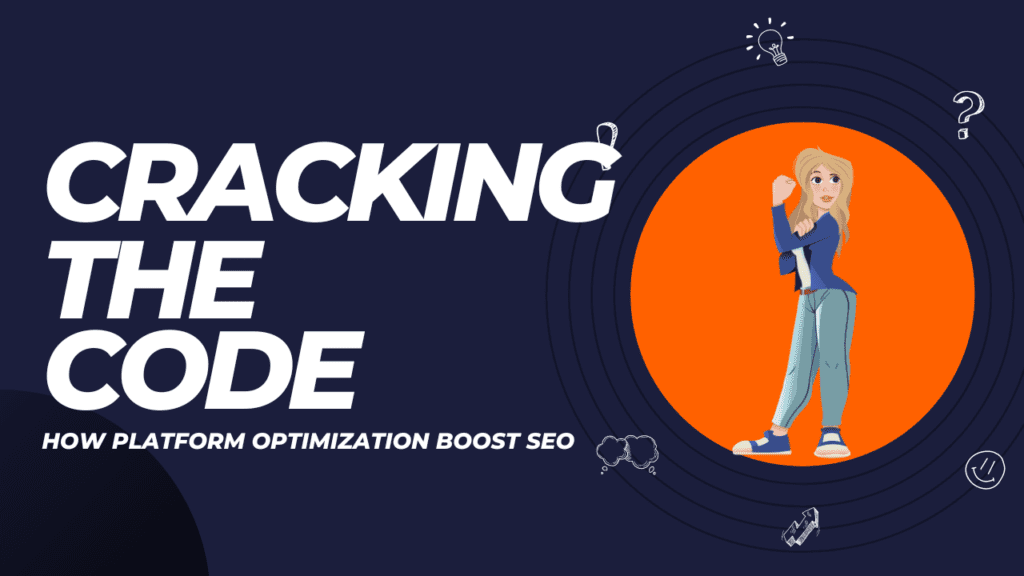Cracking the Code: How Platform Optimization Boosts Tulsa SEO Results.

Ah yes, the term that stands out like a beacon of light in a sea of business resources aiming to thrive in the digital realm. Search Engine Optimization, or SEO, is the secret sauce that can take your business from the shadows to the spotlight. If you’re a business owner in Tulsa, you might have heard the term “SEO Tulsa” thrown around. But what exactly is it, and how can you harness its power to boost your business? In this blog, we will decode the challenges and opportunities unique to Tulsa’s market by unraveling the mysteries of platform optimization. The article will equip you with the knowledge to transform your online presence. Armed with these insights, you’ll not only grasp the importance of SEO Tulsa but also possess the tools to implement strategies on both mobile AND desktop to propel your business to new pinnacles of success.
Hey, my name is D.A Myers, and I’m the web lead and AD strategist here at Myers Marketing. I want to talk to you for a quick second today about desktop SEO versus mobile SEO. There’s a lot of controversy over this, whether or not you do something different for desktop than you do for mobile. Is your mobile site something that you put on a subdomain? Facebook is one of the perfect examples for this. If you’re not on the app, but you are on your phone on Facebook, you’ll notice in the URL bar. It’s Facebook for mobile. They have a completely separate code for their mobile version of Facebook, which is just one of the ways which you can aim mobile SEO differently than your desktop SEO. And so I just want to talk to you a little bit about the differences and not necessarily give you the way but maybe ask some good questions and get your mind going. So desktop SEO… if you think about when you’re on your desktop, there are lots of things that you can look up. You can look up things that are, in fact, local, but you can also look up things that are in Mumbai or England. Really you can, you can look up just about anywhere, and that’s particularly the main use for desktops. It’s not geographically limited as compared to typical use for a mobile phone is geographically limited. And so when we talk about SEO and what strategies do we apply to desktop and what strategies do we apply to mobile, there are lots of companies out there that do exactly the same. We want to hit everyone everywhere and so if they’re gonna target a specific geographical area. They’re going to do it both on desktop and on mobile, and that’s not a bad thing; it’s just one way to do it. You also have, if you are going to be a little bit more broad, if we’re going to go with our business, for example, marketing. Well, I want to hit marketing as a very broad way of hitting that particular keyword, we can do that on desktop, but when we move over to mobile, I really want to focus on Oklahoma marketing or Texas marketing. I really want to focus in so that when someone’s on their phone, and they search Tulsa marketing or Oklahoma marketing or Texas marketing, I’m gonna pop up specifically on their phone. Google has inserted a lot of different changes to their algorithm. When it comes to mobile readiness and mobile versions of websites, and we really think that this this also involves SEO, and so there’s a lot of companies out there that kind of split. They say we’re going to do something different on desktop than we do on mobile, and so I guess that’s that’s the question that I pose to you. If you have an opinion or if there is, you know, something you want to say about this, leave it down in the comments. I want to read it, and I’ll respond to it if there is anything to do with mobile versus desktop and SEO that you have to say. I want to hear it, and let’s get after it in the comments.
Importance of SEO and the Role it Plays for Businesses
Like a physical location has signage to identify the business, SEO is like a signpost on the internet that helps people find your store online. When someone searches for a product or service you offer on search engines like Google, you want your website to pop up on the first page of results. The higher your website ranks, the more likely people will click and explore what you offer. When it comes to SEO, it’s not just about having a pretty website; it’s about ensuring the right people can find it.
What is Platform Optimization?
Think of your website as a ship sailing through the vast ocean of the internet. Platform optimization ensures that your ship is well-built, equipped with the latest technology, and sails smoothly, regardless of the conditions. In simpler terms, platform optimization is all about making your website work like a charm, not just for your customers but also for search engines like Google.
Platform optimization involves a combination of technical and creative strategies. It’s not only about having eye-catching visuals and compelling content but also about the behind-the-scenes technical details that search engines love. When search engines find your website easy to navigate, quick to load, and packed with helpful information, they reward you with higher rankings. It’s like getting a gold star from the search engine teacher!
Unique Challenges and Opportunities for Businesses in the Tulsa Area
The Tulsa business landscape comes with its own set of challenges and opportunities. While competition is fierce, the local community values authenticity and supports local businesses. Your business is not just another faceless corporation; it’s part of the Tulsa community. By optimizing your online presence for Tulsa SEO, you’re telling search engines, “Hey, I’m here, and I’m a local gem!”
Importance of Local SEO and Targeting Tulsa-Specific Keywords
Imagine you’re searching for a great burger joint in Tulsa. Would you type “best burger joint in the world” or “best burger joint in Tulsa”? Chances are, you’d go for the latter. A specific location is where local SEO comes into play. It’s all about using keywords specific to your location, making it easier for people to find you in Tulsa or whenever your business is.
Optimizing Website Structure for Tulsa SEO
Your website’s structure is like the blueprint of a house. It determines how easy it is for visitors to navigate and find what they’re looking for. A well-organized website, accessed on a desktop, tablet, or mobile, keeps visitors happy and makes search engines like Google give you a thumbs up.
Desktop SEO
When seated at your trusty desktop, the entire online world is at your fingertips. You can cover everything from exploring local eateries to researching global trends. However, this non-geographical nature of desktop usage has significant implications for your SEO strategy.
Desktop SEO allows you to cast a wide net. You can reach customers far and wide, potentially targeting a global audience. This approach can efficiently target broad keywords such as “restaurants.” However, with the expansive reach comes fierce competition. Your content needs to be of the highest quality, offering unique value to your audience.
Consider the scenario: Harnessing the Power of Broad Keywords
Example: You’re in the food service industry. Targeting a broad keyword like “restaurant” can bring substantial traffic. However, with significant traffic comes great responsibility—you must ensure that your content is relevant but also engaging and informative. In a competitive landscape, delivering excellence in every aspect of your digital presence becomes vital to setting yourself apart.
Mobile SEO
Shift your focus to the small screen—your smartphone. Suddenly, the world seems smaller, and your searches become localized. Welcome to the realm of mobile SEO.
Ever noticed how certain websites have distinct mobile versions, like Facebook’s mobile app? A separate mobile version isn’t merely a design choice—it’s a strategic move driven by Google’s evolving algorithms. The emphasis on mobile readiness has turned having a mobile-friendly site into a necessity, not an option.
For mobile SEO, local matters. Let’s say your business operates in Oklahoma. Tailoring your content to keywords like “Tulsa restaurants” or “Oklahoma restaurants” ensures you’re front and center when locals search for places to eat on their smartphones.
Google's Mobile-First Revolution
Google’s algorithm changes have put mobile at the forefront. The shift toward a “mobile-first” approach means that Google primarily uses the mobile version of your content for indexing and ranking. Neglecting mobile SEO can lead to a significant drop in search rankings, resulting in missed opportunities.
Page Speed for SEO Optimization
Imagine you’re waiting in line at your favorite Tulsa food truck. You’re hungry, excited, and just a little impatient. If the service takes a long time, you might lose interest and look for something else. The same principle applies to your website. If web pages take a while to load, people will bounce off and head to a faster competitor. Page speed isn’t just about keeping visitors happy; it’s also a factor that search engines consider when ranking websites. Keeping up maintenance with maintenance on your website helps you determine the page load time speeds and the steps you can take to optimize loading speeds.
Enhancing User Experience with Design
Design isn’t just about making your website look pretty; it’s about creating an experience that engages visitors. Just like a welcoming storefront invites customers into your physical store, a well-designed website invites visitors to explore further. From easy navigation to clear calls to action, every design element should guide your visitors toward becoming loyal customers.
The Crossroads: Unified or Diverse Strategy?
As businesses contemplate whether to create distinct desktop and mobile SEO strategies, a fundamental question arises: Should they aim for unity or diversity?
The Unified Approach
Some businesses opt for a unified strategy that delivers a consistent device experience. While this approach ensures messaging and user experience coherence, it may only partially leverage each platform’s strengths.
The Diversified Approach
On the flip side, businesses embrace diversified strategies, adapting content to cater to each platform’s strengths, limitations, and user behaviors. This approach capitalizes on the specific advantages of both desktop and mobile environments.
Your SEO Path Forward
The debate between desktop and mobile SEO goes beyond technicalities—understanding your audience and meeting their needs effectively. Striking a balance between unified and diversified strategies is crucial. Remember, a strong desktop presence casts a wide net, while mobile SEO zeroes in on local impact. By seamlessly integrating both, you position your business for digital triumph.
How Can Myers Help?
SEO Tulsa isn’t just a buzzword – it’s the key to unlocking a world of opportunities in your local community. By embracing platform optimization and making your website a seamless experience for customers and search engines, you’re setting the stage for your business to thrive in the bustling city of Tulsa. The team of website and SEO experts at Myers Marketing Management understands the ins and outs of making your website shine in the search engine spotlight.
Evaluate Your Current Strategy
Assess whether your approach adequately addresses desktop and mobile SEO.
Analyze User Behavior
Dive into analytics to gain insights into how your audience interacts with your site on different devices.
Optimize for Mobile
Ensure your website is mobile-friendly, responsive, and optimized for swift loading.
Leverage Local Keywords
Tailor your content to include relevant local keywords to enhance visibility among local audiences.
Prioritize Quality Content
Quality content remains the bedrock of SEO success. Deliver value, address pain points, and engage your audience effectively.
Stay Informed
Stay updated on the latest SEO trends and Google algorithm changes to keep your strategy up-to-date and effective.
We specialize in helping your business develop a strategy to crack the code of Tulsa SEO and platform optimization and maintaining your website to optimize the user experience. Let’s schedule a meeting to talk strategy and create a plan to boost your online presence!



